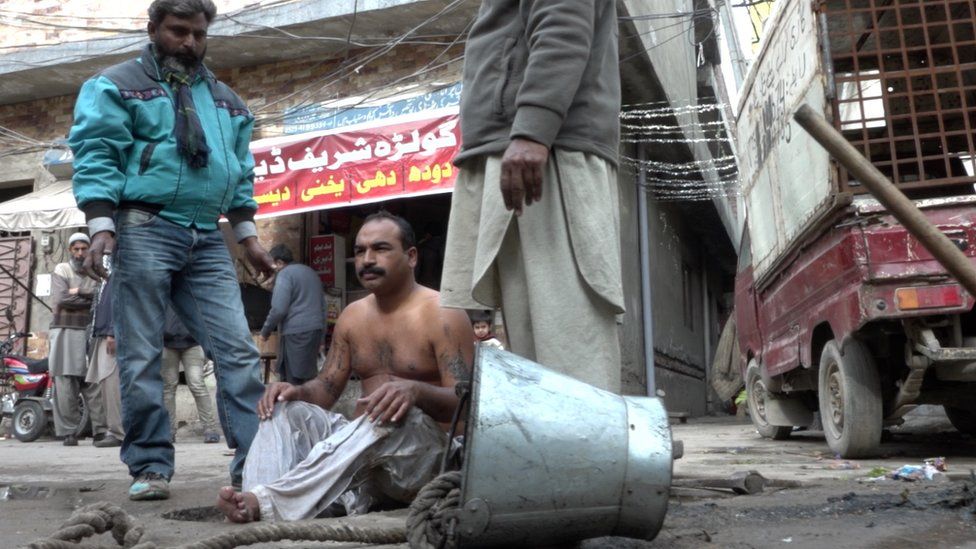
Darkness eight feet below the ground, dirty water full of
human waste coming up to the mouth, rats, red bags and snakes and the stench
that makes even breathing difficult.
Have you ever wondered where all the water that flows as
soon as you flush the toilet goes away?
It falls into the sewer through the gutter of your house and
if it ever closes, a living person like you will come in and clean it.
Today, as man prepares to set foot on Mars and robotics and
artificial intelligence challenge his intellect, it is no less a tragedy to see
these savages pick up the filth from the human body with their own hands.
Fight
to the death
Shafiq Masih, 43, stood on the street, took off his neatly
ironed jeans and T-shirt and put on a white shalwar. He put his shoes, mobile
phone and wallet on his motorbike and hung his legs on the gutter.
Two companions grabbed his hands and let him down. A
sewerman threw down an empty bucket tied with a rope and Shafiq Masih picked up
the dirt from the gutter with his hands and started pouring it into the bucket.
When the bucket was full, the comrades standing at the top pulled the rope and
emptied the bucket and threw it down again.
This outdated sewer cleaning process sometimes lasts for
several hours. When Shafiq Masih's work was completed, the companions standing
above grabbed his hand and pulled him out. When he regained his breath, he
began to wipe the dirt off his body with a cloth.
"No one does it on their own, but they have to do
it," he said. Sometimes a person has to do what he does not want to do.
Severman embraces the dangers and descends into the gutter. We make a living by
fighting death every day.
Toxic
gas
But what is it about these gutters that severmen feel like
death hovering over their heads at any moment? Marie James Gill, a social
worker and former member of the Punjab Assembly, gives the answer."Because
sewers contain organic matter, they combine to release dangerous gases such as
hydrogen sulfide, ammonia and carbon monoxide. Sewermen come in direct contact
with gases inside the gutter which can be fatal. These gases also cause skin
and respiratory diseases. Some sanitary workers have poor eyesight, some have
premature graying of their hair and some develop diseases such as hepatitis A
and B.The biggest reason for sewer systems to be blocked around the world is
the dumping of garbage in them. During his 19 years of service, Shafiq Masih
has removed all kinds of garbage from the sewer."People often throw
household rubbish, towels, empty bottles and scrap metal down the drain. In
addition, waste from hospitals and factories also reaches the sewers. Many
times when I went down the gutter, a piece of glass, a needle and a blade got stuck
in my hand or foot and I was injured.
Accurate statistics on accidents and deaths of sanitary
workers during cleaning work are not available. If you look at the claims of
social organizations and the incidents reported in the media, their number is
very high.
According to a survey, 40% of sanitary workers say they have
had an accident at least once during their work due to a gas leak in the sewer.
According to Shafiq Masih, the majority of sewers have
neither safety equipment nor a gas meter to check the amount of gas before
landing in the sewer.
"Local authorities provide safety equipment to some
sewermen, but it is incomplete, while most workers do not know how to use them
properly," he said. We should be given a complete kit of safety equipment
(PPE) which includes helmets, safety belts, oxygen cylinders, boots, masks and
gloves. In addition, proper tools should be provided to work in the saver.
The sewerage system in South Asia was formed when the flush
system was introduced inside the toilets in urban areas during the British
rule. Drainage pipelines as well as sewers or gutters and 'manholes' were built
in the style of the London-based sewerage system.
The size and structure of the 'manhole' was such that the
sewermen could get inside the gutter and clean it by hand. Almost a hundred
years later, this system of sewers and sewers still exists today.
Drainage in urban areas of Pakistan is now the
responsibility of local bodies and municipalities who employ sewermen or
kandimen to maintain the system.
Private housing societies and cantonment boards also run
separate sewerage systems. In the villages, this work is done on a private
level, but where there is no regular sewerage system, human waste is still
picked up and disposed of by hand.
The word that Shafiq Masih has heard the most in his life is
'wide' but what is the meaning of this word and who are these? It also has a
history.
Cleaning in the subcontinent has always been associated with
caste, but now this distinction has taken on a religious color.
According to historians, the ancestors of most Christians
living in Pakistan belonged to the Dalit Hindu caste 'Chuda' who were converted
to Christianity by the clergy in the late 19th century. After conversion, these
people started working on the lands of Sikh landlords of Punjab.
When the subcontinent was divided and the Sikhs left
Pakistan, Muslim immigrants from India fired them.















0 Comments